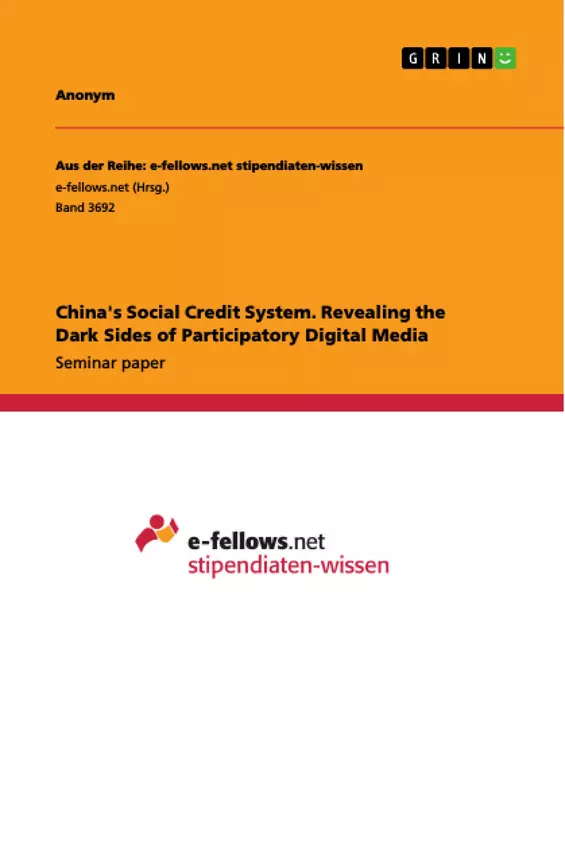This paper discusses China’s social credit system. In a speech on October 14th in 2018, American Vice President Mike Pence accused China of building “an Orwellian system premised on controlling virtually every facet of human life”. These accusations refer to the so-called Chinese Social Credit System (SCS), a radical undertaking of the Chinese Communist Party, making use of technologies such as ubiquitous computing, big data and artificial intelligence combined with participatory digital media, intending to construct a scoring system for its citizens and corporate entities in China.
In the past years, China’s initiative has been heavily criticized by leading Western media outlets and politicians, compared to the Netflix series Black Mirror or Big Brother and described as a sinister future dystopia. The reality, however, is complicated and requires a critical analysis. In a first step, it will be explained what the scoring system exactly is and how it operates, taking the political system and cultural background into consideration. Next, the implications for Chinese people as well as society will be critically assessed, and it will be discussed whether this system is indeed a dystopian vision of mass surveillance or rather an opportunity for a better society.
Inhaltsverzeichnis (Table of Contents)
- Introduction
- What is China's Social Credit System?
- How does the Social Credit System work?
- Understanding the background
- What are the consequences for the Chinese people?
- Public Perception of the Social Credit System in China
Zielsetzung und Themenschwerpunkte (Objectives and Key Themes)
This document critically analyzes China's Social Credit System (SCS), examining its underlying principles, implementation, and potential consequences for both individuals and society. The goal is to provide a nuanced understanding of this complex initiative and assess its implications beyond the often-cited dystopian narratives.
- The functionality and operation of the SCS
- The social and economic implications of the system
- The historical context and political framework of the SCS
- The system's influence on individual behavior and public perception
- Comparisons with other rating systems and its potential for misuse
Zusammenfassung der Kapitel (Chapter Summaries)
- Introduction: The introduction contextualizes the SCS within the broader discourse surrounding China's digital transformation and its impact on individual freedoms. It also provides a brief overview of the document's structure and the central themes to be explored.
- What is China's Social Credit System?: This section delves into the origins and goals of the SCS, highlighting its intended role in fostering trust and market order within the Chinese economy. It also explores the different elements and stages of its development, acknowledging the complexities and ambiguities inherent in its implementation.
- How does the Social Credit System work?: This section provides a detailed description of the SCS's operational mechanisms, outlining the data collection methods, scoring criteria, and the potential sources of information. It also examines the role of both official and private entities in the system's development and operation.
- Understanding the background: This section sheds light on the historical context surrounding the SCS, emphasizing the influence of China's long tradition of state bureaucracy and the role of Confucian values in justifying systems of social control. It also analyzes the current political system in China and its implications for the SCS's implementation and acceptance.
- What are the consequences for the Chinese people?: This section delves into the practical effects of the SCS on individuals, examining the various rewards and penalties associated with different scores and offenses. It explores the impact of the system on travel restrictions, access to public services, and the potential for public shaming.
Schlüsselwörter (Keywords)
This text examines key concepts such as digital surveillance, participatory digital media, social control, trust, market order, data privacy, social credit scoring, and the impact of the SCS on individual freedoms and society in China.
Frequently Asked Questions
What is the main goal of China's Social Credit System (SCS)?
The SCS is intended to foster "trust" within society and strengthen market order. It uses big data and artificial intelligence to score citizens and corporate entities based on their behavior, financial reliability, and social contributions.
How does the system collect data on citizens?
Data is gathered through ubiquitous computing, digital media, financial records, and official government databases. Both state agencies and private tech companies play a role in monitoring activities.
What are the consequences of a low social credit score?
Individuals with low scores may face travel restrictions (e.g., being banned from buying high-speed train or plane tickets), limited access to public services, higher interest rates, or even public shaming.
Is the Social Credit System purely a dystopian tool?
While Western media often compares it to "Black Mirror," the reality is complex. Some proponents argue it provides opportunities for a more honest society and better market regulation, though critics highlight the risks of mass surveillance and loss of individual freedom.
What is the cultural background behind the SCS?
The system is rooted in China's long tradition of state bureaucracy and Confucian values, which emphasize social harmony and the state's role in maintaining moral and social order.
- Quote paper
- Anonym (Author), 2019, China's Social Credit System. Revealing the Dark Sides of Participatory Digital Media, Munich, GRIN Verlag, https://www.grin.com/document/974186



